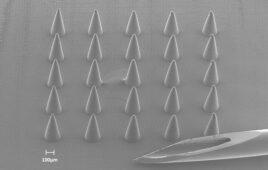Malaria treatment resistance could be avoided by studying how resistance evolves during drug development, according to a new paper published in Cell Chemical Biology.
In a study led by Tony Holder’s lab at the Crick and Ed Tate’s satellite lab at the Crick and his lab at Imperial College London, scientists generated malaria parasites resistant to a promising new class of candidate antimalarial drugs. By analysing the structural changes behind the resistance, they identified novel compounds that were immune to this mechanism of resistance.
Their findings could form the basis of the next generation of combination therapies, which are urgently needed to counter emerging widespread resistance to existing treatments.
“Evolutionary resistance to frontline treatment is inevitable, it’s just a question of time,” says Tony Holder, Group Leader at the Crick and senior author of the paper. “By factoring resistance studies into early drug design, we can safeguard from resistance in the years to come. Rather than being on the back foot, we can plan for and prevent resistance.”
Interdisciplinary science
Malaria remains one of the world’s most devastating infectious diseases, claiming hundreds of thousands of lives each year. The team set out to study resistance mechanisms in the deadliest malaria parasite, Plasmodium falciparum.
In P. falciparum, the ‘NMT’ enzyme is vital for a range of functions including invading human red blood cells, where the parasites divide and multiply. Compounds that block this enzyme are currently being developed in the hope that they could form the basis of new medicines against malaria.
In this study, the team detected natural resistance in some P. falciparum parasites in the lab after just a few weeks of administering NMT inhibitors. By comparing the genetic makeup of the resistant and non-resistant strains, they were able to detect a small mutation. Using gene editing, they confirmed the mutation was responsible for the acquired resistance.
Using X-ray crystallography, the researchers visualised the structural change caused by the mutation. Making use of expertise in the Crick-GSK LinkLabs, the team used these structural insights to identify compounds that target a different part of the parasite NMT enzyme, and therefore evade the same resistance mechanism..
“Taking an interdisciplinary approach, we were able to identify compounds that evade parasite resistance, making them ideal candidates for a potential combination therapy against malaria,” explains Anja Schlott, joint Crick/Imperial Ph.D. student and first author of the paper.
Wider implications
Although the study was focussed on the malaria parasite P. falciparum, NMT inhibitors—and the potential for resistance—are also relevant for a wide range of parasites and fungi. Identifying combinations of compounds that could work alongside NMT inhibitors will be an important step to combat the evolution of resistance in numerous infectious diseases.
“Our approach of studying resistance mechanisms during drug development has wide reaching applications in medical science, including overcoming chemotherapy resistance in cancer” says Ed Tate, Professor of Chemical Biology at Imperial College London, who runs a satellite lab at the Crick, and senior author of the paper.
“The project was only made possible thanks to a unique combination of expertise including parasitology, chemical biology and drug discovery from all of our collaborators.”




